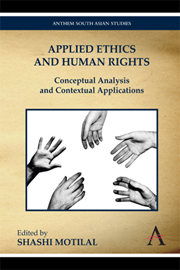Book contents
- Frontmatter
- Contents
- Preface
- Introduction
- Part One Rights, Obligations and Responsibilities
- Part Two Human Rights Issues
- 10 Fragile Identities and Constructed Rights
- 11 Affirmative Action: Compensation or Discrimination?
- 12 Ethics, Human Rights and the LGBT Discourse in India
- 13 Distributive Justice: Locating in Context
- 14 Punishment and Human Rights
- 15 Rights of the ‘Mad’ in Mental Health Sciences
- 16 Choice, Life and the (m)Other: Towards Ethics in/of Abortion
- 17 The Nationalist Project and the Women's Question: A Reading of The Home and the World and Nationalism
- 18 On the Idea of Obligation to Future Generations
- 19 Morality in Cyberspace: Intellectual Property and the Right to Information
- 20 Violence – A Right to the Survival of the Self?
- 21 ‘Moral Obligation’ to Fight for the Prevention of Greater Calamity: A Debate between Sādharana Dharma and Sva Dharma
- 22 Globalisation and Human Rights
- Notes on Contributors
20 - Violence – A Right to the Survival of the Self?
from Part Two - Human Rights Issues
Published online by Cambridge University Press: 05 March 2012
- Frontmatter
- Contents
- Preface
- Introduction
- Part One Rights, Obligations and Responsibilities
- Part Two Human Rights Issues
- 10 Fragile Identities and Constructed Rights
- 11 Affirmative Action: Compensation or Discrimination?
- 12 Ethics, Human Rights and the LGBT Discourse in India
- 13 Distributive Justice: Locating in Context
- 14 Punishment and Human Rights
- 15 Rights of the ‘Mad’ in Mental Health Sciences
- 16 Choice, Life and the (m)Other: Towards Ethics in/of Abortion
- 17 The Nationalist Project and the Women's Question: A Reading of The Home and the World and Nationalism
- 18 On the Idea of Obligation to Future Generations
- 19 Morality in Cyberspace: Intellectual Property and the Right to Information
- 20 Violence – A Right to the Survival of the Self?
- 21 ‘Moral Obligation’ to Fight for the Prevention of Greater Calamity: A Debate between Sādharana Dharma and Sva Dharma
- 22 Globalisation and Human Rights
- Notes on Contributors
Summary
Philia begins with the possibility of survival.
Surviving – that is the other name of a mourning
whose possibility is never to be awaited.
–Derrida, Politics of FriendshipMr. & Mrs. Iyer
A bus full of passengers makes its way through the hilly tracts of the southern part of India. As the bus makes its way through the hills, a riot breaks out somewhere on the route the bus is to follow. The bus is invaded by a group of Hindu fanatics. They are in search of Muslims. They undress one by one the male passengers of the bus to find out who among them are Muslims. As they go about doing this, one passenger, presumably in a bid to save all the passengers of the bus, cries out: ‘Hum sab Hindu hain.’ (‘We are all Hindus.’) It is at this moment that a male passenger (named Cohen), seated at the rear end of the bus, interjects: ‘No, not all are Hindus – they are not Hindus.’ And he points at an old couple seated in the left hand corner of the bus: ‘They are Muslims – they are not Hindus.’ The old couple is dragged out of the bus, never to be seen again. When asked later why he did such a thing, the visibly dejected and crestfallen Cohen answers: ‘They would have caught me. I am a Jew. I do not have a foreskin.’
- Type
- Chapter
- Information
- Applied Ethics and Human RightsConceptual Analysis and Contextual Applications, pp. 265 - 292Publisher: Anthem PressPrint publication year: 2010

